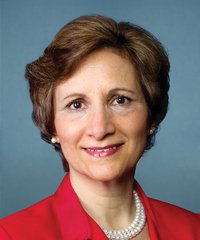
Congresswoman Suzanne Bonamici represents the First Congressional District of Oregon, which includes Washington, Yamhill, Clatsop, and Columbia counties and part of Multnomah County.
Strengthening public education is one of Suzanne's top priorities and one of the reasons she got involved in public service. Suzanne spent hundreds of hours volunteering in public schools before serving in the Oregon State Legislature, where she passed legislation to reduce duplicative testing. In Congress, she is a leader on the Education and Labor Committee and Chair of the Subcommittee on Civil Rights and Human Services.
When I worked at Legal Aid, I worked with uninsured families who had been bankrupted by an illness and were experiencing financial hardship on top of poor health. The Affordable Care Act has significantly expanded access to health care, including children’s oral health services, and we must maintain its protections for people with pre-existing conditions and insurance subsidies for people who qualify financially. More must be done, however, to make sure everyone has access to affordable, quality health care. I am proud to be a member of the Medicare for All Caucus and will continue to work to expand coverage and make health care more affordable for all.
The COVID-19 pandemic has exacerbated and highlighted the inequities that exist in our health care system, with communities of color and low-income communities being hit the hardest. I helped secure needed relief to sustain our local health care system at the peak of the pandemic and increase access to essential care and vaccines. I’m committed to getting critical care providers the resources they need to respond to the COVID-19 crisis – and any future pandemics -- by making additional investments in public health infrastructure, community health systems, prevention efforts, vaccine development and distribution, and more.
It is critical that we build a health care workforce that can meet our country’s increasing needs. As a leader on the Congressional Nursing Caucus I helped craft bipartisan solutions to address the nursing shortage across the country, including making sure we have safe staffing in hospitals and providing additional funding for nurse training and workforce development.
Across the country and here in Northwest Oregon, communities are experiencing the tragic and often deadly emergency of opioid abuse. I have met with parents, health care professionals, community leaders, veterans, and people from all walks of life who have shared heart-wrenching stories about how the opioid crisis is taking lives and inflicting pain on Oregon families. My report on the opioid crisis includes what I learned, what steps we’ve already taken, and my priorities moving forward. One priority is making it as easy to dispose of unused opioids as it is to get a prescription. I introduced The Safe Disposal of Opioids Act to create a grant program to help pharmacies and other qualified locations install and maintain drug disposal bins. This bill requires opioid manufacturers to fund these grants through a small fee on the opioids they sell.
Rising prescription drug costs are a burden for many Americans, particularly seniors. I have heard too many stories of seniors forced to leave a prescription unfilled or cut pills in half because of high costs. We must do more to make prescription drugs more accessible and affordable to everyone. Current law prohibits the Secretary of Health and Human Services from negotiating for lower drug prices in Medicare. We should reverse this unnecessary restriction and leverage the purchasing power of the government to negotiate better prices for medications.
I will continue to be a strong advocate for consumers and patients as we work to address prescription drug costs and improve access to affordable health care for all.